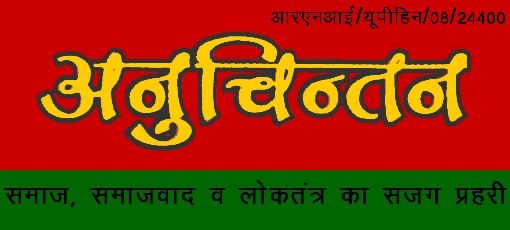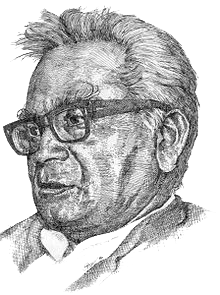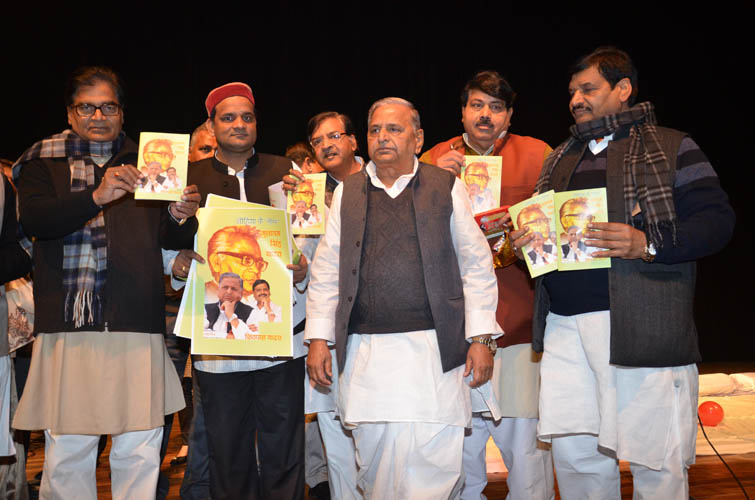स्वतंत्रता संग्राम, समाजवादी आंदोलन व डॉ0 लोहिया
TRIBUTE TO EVER FIGHTER DR. LOHIA
-HARRIS WOFFORD
डा0 राम मनोहर लोहिया ने अमरीका में सत्याग्रह का रंग-भेद के विरुद्ध प्रभावशाली अभियान चलाया। अमरीकी जन-मानस को प्रभावित करने वाले वे (महात्मा गांधी व स्वामी विवेकानन्द के बाद) तीसरे बड़े भारतीय नेता हैं। यह लेख उनके योगदान व व्यक्तित्व से प्रभावित हैरिक वोफोर्ड का है। श्री वोफोर्ड अमरीका के सीनेटर, मार्टिन लूथर किंग तथा अमरीकी राष्ट्रपति जाॅन, एफ0 कैनेडी के सहयोगी तथा सलाहकार रहे हैं।
When Che Guevara died, many radical young Americans toasted his name. We each should have our favorite revolutionaries, political artists and teachers, and I have been luckier than anyone deserves. Yet in one season of death, the most Socratic teacher I ever expect to meet (and a friend of Rammanohar Lohia's), Scott Buchanan, has died; and two of the men to whom I was most devoted in politics, Robert Kennedy and Martin Luther King, were killed. And this year of tears began with the terrible loss of Rammanohar Lohia, a man who will always walk on the waters of my memory as the embodiment of a permanent and peaceful revolution. Rammanohar would have appreciated the reason this tribute was somewhat delayed: that a funny thing happened to its author on the way to the Post Office he went to jail. "When will you go to jail?" Rammanohar kept pressing that question in each of our meetings over the last ten years. Almost as if to show that it wasn't too difficult, even in America, he himself on his last visit here was arrested in Mississippi for disobeying local segregation practices. It was a question he had put to young audiences, and particularly to Negroes, on his first trip here in 1951. His widespread and eloquent case for civil disobedience, as a powerful and necessary form of political persuasion in a complex modern society, was one of the outside factors along with many internal American factors, that moved some young Negroes, such as Martin Luther King, to begin a decade of non-violent direct action. Rammanohar would also have approved the particular issue that led to this writer's arrest and one-night stand in a Chicago jail: a peaceful march in protest against police violence and lawlessness in breaking up popular demonstrations during the Democratic National Convention. It was over police violence under an administration of his own party that Rammanohar once resigned from the leadership of his Party. Believing that there was no more important issue than affirming that an Asian is not a fly and that the State must respect and protect human life, Rammanohar had called for the resignation of his Party's first state government, pending an investigation of the facts of a police killing of some demonstrators. When they failed to follow his lead, he himself resigned. On his 1951 trip to the United States, he" had talked of the need for that kind of action: "I wish a tribe of politicians arose all over the world, which would specialize in doing its job without holding offices. A big problem for mankind today is how to tame power. Perhaps one way to do that is by voluntary abdication of power. At least we should give that a try." In retrospect, it is amazing how relevant to our current affairs are the major themes of Lohia's 1951 visit - and of his main ideas over the years. His formula of Spade, Prison and Vote reflects the means we are coming to call "the New Politics." The Spade, he said, was the symbol for unpaid constructive activity and voluntary service. He wanted to see full-time volunteer brigades and millions of part-time volunteers giving "one hour a day for the community." The prison symbolized the climax of many less drastic forms of peaceful direct action protest. The traditional democratic method of the Vote would be less of a skeleton if people no longer felt powerless between elections; if they took on the flesh and blood of volunteer service and non-violent struggle. Against racial segregation and against the war in Vietnam thousands of Americans have been standing up, sitting down, marching and going to jail. And more and more Americans are discovering that it is possible and necessary to engage in immediate constructive service, to do something human and significant now even before securing state power, to invent institutions and organize private programmes of reform even without winning elections. One of the strong lines Robert Kennedy was pursuing in his last year was what Lohia would call the Spade. Black citizens are using the Spade, on an increasing scale, to make Black Power a reality in a score of inner-city communities. The overseas Peace Corps of a dozen countries and many domestic volunteer programmes represent this, too, and Secretary General U Thant has proposed the universal recognition of one or two years' volunteer service at home or abroad as an essential part of one's education as a citizen. Lohia's other main goals, which seemed to some so romantic two decades ago, have also been turned up by the political tides as very contemporary proposals. Recalling his words during the 1951 trip, one sees what a coherent and instructive view of the world he lived by. Decentralization - his idea of "government of the local community, by the local community, for the local community"- is now a current battle cry even in America, the citadel of big organization and centralization. "The only way to make democracy live to the people would be to cut up sovereign power in as tiny bits as possible so that the common man in his village and township can understand political affairs and make intelligent use of them", he said. Such decentralization would "enable us to rouse populations into activity." Black leaders are saying the same thing now. With the drive of black communities for power, and new theories of federalism emerging, town and regional as well as state and federal governments may yet be empowered and Lohia's Four Pillar State become a reality. Once Lohia said he was honoured to be called a "Jeffersonian Socialist" but added that Jefferson was dangerous although "very regretfully a Jefferson has not so far ever won in any country." "A Jefferson is sanctified in a University while a Hamilton prevails in Wall Street. All the streets, all the pavements, all the machines, all the clothes, and every thing that we do, is Hamiltonian. The time has come on the world's stage for Jefferson to win." At least the time has come when more and more people everywhere share Lohia's sense of the equal irrelevance of capitalism and communism. "The distinctions between the two camps are obvious. I am thoroughly aware of the evils of the Soviet system. But to distinguish between them is hot to prefer. I just don't. I want something new, that goes beyond Mr. Ford or Mr. Stalin, and I would be lost if I stopped to prefer one of the old systems. We want neither. Communism can give as little bread to Asia as capitalism can give it freedom. Both are doctrines of centralization." ? Both lacked what Lohia called "soul." Stalin had asked, t "What is this thing called 'soul'?" The reply: "that which you have not got." Lohia Added: "Ford and Stalin are different eyes of the same mind. They both believe in mass production, large-scale technology, and centralization, and this ultimately means the same kind of civilization. If all this, in the form of either capitalism or communism, could be applied in our two-thirds of the world, then I would be on weaker ground, but it simply cannot work. To bring India to the U.S. level it would require, say, five hundred billion dollars." It may ? be people in countries of affluence who are drawn most to Lohia's idea of new civilization that would "abolish poverty and attain a decent standard of living - but which will not awaken the erosive urge to an ever increasing standard of living." In Alabama he was asked by a prosperous farmer: "Now that we have this materialistic bull by the tail, how do you think we can let him go?" Lohia prophecied; "Today, anyone to be listened to must pay homage to mass production and its system, but I suggest that twenty years hence, anyone who wants to benefit mankind must operate inside the concept of a decent standard of living." Nearly twenty years later the Third Camp that Lohia championed, "the Asia of peaceful change"; a "free and united Africa," the belt of independent nations from Belgrade to Jakarta, was still in Lohia's terms "soft", yet one of his prescriptions for hardening it - keeping out of the cold war conflict - was spreading. And the Yugoslavia Lohia loved not only still stands, its infection is spreading within the Communist world. "Should all the small or retarded nations of the world as determinedly seek their own patterns of progress and freedom as Yugoslavia has done," he said upon arrival in New York from Belgrade, "the international caste system of five Brahmin nations and over sixty pariah nations will begin to end." And through it all, every through his recurring anger and many disappointment, even with an ashen taste in his mouth, he laughed. Not long before his death I read a curious article in Mankind in which Lohia's laugh was criticized. Indians were put off by this smiling, they could not take a man seriously who laughs so much, the article concluded. That brought a flood of memories over me, of our first meetings, when it was his merriment in the midst of action that so intrigued and charmed us. Later we saw him retain that merriment in the midst of much melancholy and - even agony. What he called "the vanity of fulfilment" was never his to enjoy. Yet he remained a happy warrior; So I would amend the proposition: Do not take a man seriously who does not laugh about the important things. In 1951 Lohia went to meet Albert Einstein in Princeton, and the great, hearty laughs these two men shared as they surveyed the world are unforgettable. "May I ask you a question, Dr. Einstein?" Lohia had begun. "Not about politics. I have come to learn from you, and in politics I suppose I might even have something to tell you. But in the higher field of the human mind we need your help. In Berlin, I said that our age has thought only twice, Mahatma Gandhi and atomic energy; one is gone and your invention is a source of death. How is the human mind to get out of stagnation, this confinement and rigidity which is stifling it? Do you see integration which can be free thought for voyages of discovery?" When the two men parted, Einstein put his arm around Lohia and said: "It is so good to meet a man - one gets so lonely."


